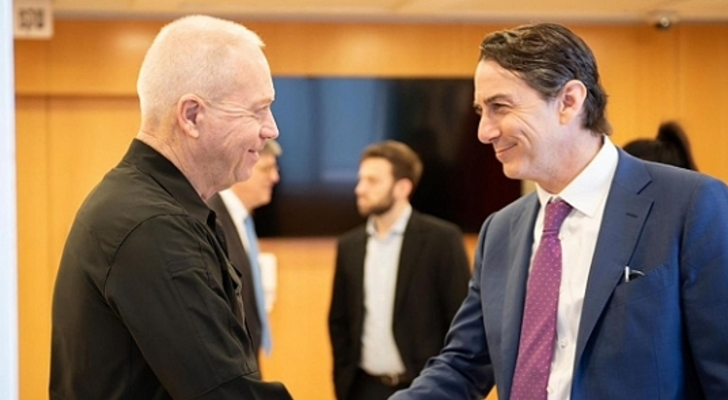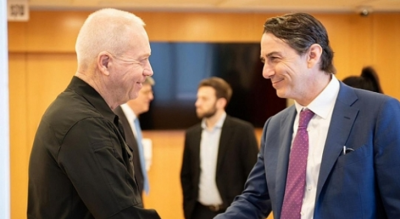Israeli Defense Minister Yoav Gallant reiterated on Tuesday his warning that the ongoing tension with Hezbollah brings matters closer to military escalation, during his meeting with U.S. presidential envoy Amos Hochstein in Tel Aviv. This meeting took place one day after Hochstein's discussions in Beirut aimed at mediating a ceasefire along the southern border of Lebanon. Hochstein arrived in Tel Aviv after a series of meetings in Beirut with political officials and Lebanese opposition forces, which for the first time since October 8—when Hezbollah entered the conflict—engaged in ongoing U.S.-Lebanese discussions about the southern crisis and proposals for establishing a permanent ceasefire and applying Resolution 1701. This engagement was reflected in the meeting between representatives of Lebanese opposition forces and U.S. mediator Amos Hochstein before his departure from Beirut on Monday evening.
According to a statement from the Israeli Defense Ministry following the meeting, both parties discussed the ongoing aggression from Hezbollah. Gallant informed Hochstein of Israel's commitment to diplomatic efforts aimed at reaching an agreement that would allow the residents of northern Israel to return to their homes following changes in the security situation in the border region with Lebanon. He warned that Hezbollah's aggression brings Israel close to a critical point in making decisions regarding military activities towards Lebanon.
Hochstein had confirmed on Monday in Beirut that a diplomatic resolution is the only way to de-escalate tensions between Lebanon and Israel after about five months of near-daily cross-border shelling between the two sides. Following his meeting with Lebanese Parliament Speaker Nabih Berri, he stated that a temporary ceasefire is not sufficient, and emphasized the need to change the security framework along the Blue Line to ensure the safety of all parties. Lebanese sources accompanying Hochstein's visit noted that the proposed security framework aims to establish stability on both sides of the border, end existing tensions, withdraw Hezbollah fighters from the border, and increase the deployment of the Lebanese army in the border area.
In a noteworthy development during Hochstein's recent visit, he expanded his range of meetings in Beirut to include opposition figures for the first time. In his previous visits in November and January, his discussions had been limited to official state representatives, including Speaker of Parliament Nabih Berri, caretaker Prime Minister Najib Mikati, and Army Commander Joseph Aoun. This time, he met in the parliamentary chamber with the head of the Strong Republic bloc, MP George Adwan, bloc member MP George Oklais, head of the Kataeb bloc and party leader MP Sami Gemayel, bloc member MP Elias Hankash, and head of the Independence Movement MP Michel Moawad.
Hankash indicated that this development resulted from opposition delegations visiting decision-making capitals to voice their dissent, emphasizing that there is a segment of Lebanese society representing 70% of the population that must be heard, and that meetings in Beirut should not be limited to engaging with a prime minister who has not garnered the confidence of the elected parliament since May 2022, nor with a parliament speaker who is viewed as a partner and ally of Hezbollah. He noted that the accumulation of their visits abroad and their efforts to convey their voice led to the conviction that opposition positions in Lebanon should be considered.
During the meeting, opposition representatives called for the full implementation of Resolution 1701, including Resolutions 1559 (issued in 2004, addressing the disbandment of all unauthorized militias) and 1680 (issued in 2006), which encouraged Syria to respond favorably to Lebanon's request for border demarcation and exchange diplomatic relations, reinforcing Lebanon's sovereignty, regional integrity, and political independence.
Hankash stated that the implementation of the resolution from both sides (Lebanon and Israel) is apparent; however, it cannot be limited to addressing Israeli priorities (i.e., removing Hezbollah fighters from the border) without enforcing other provisions such as Resolution 1559, which calls for extending the Lebanese government's control over all Lebanese territory and expresses concern about the continued presence of armed militias in Lebanon that impede the Lebanese government's ability to exercise full sovereignty.
Additionally, opposition representatives called for support for the Lebanese army as it is the only institution that Lebanese people trust for their protection and border security, a mission designated for the army, not any armed militia. They also requested that the impacts of the Gaza war be separated from the electoral processes.
Linking the presidential election to the results of the Gaza war represents a major concern for opposition forces. Hankash emphasized the need to separate the two issues, reiterating the opposition's demand for an open parliamentary session to elect a president, stating that there is no constitutional mechanism other than convening the assembly in an open session to end the presidential vacancy.
Regarding the concerns raised by the opposition in the session, he remarked that the worry pertains to the core of the Lebanese entity, considering that greater control by one party in the country leads to a more significant bleed-out and contributes to undermining the state and the concept of institutions. He added that what is happening now regarding the presidential issue is outside the framework of institutions, and the only way to resolve the vacancy is through the constitutional mechanism.




